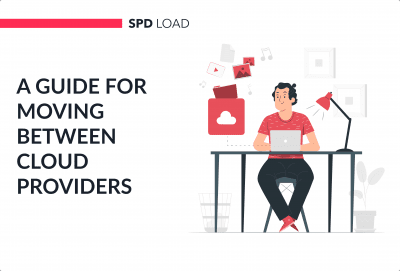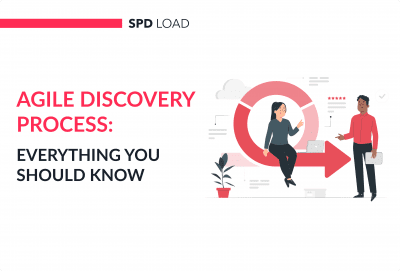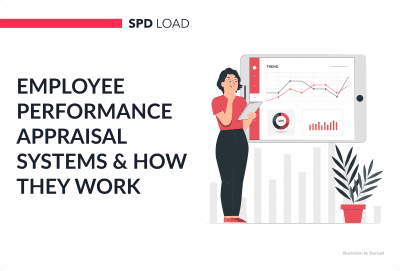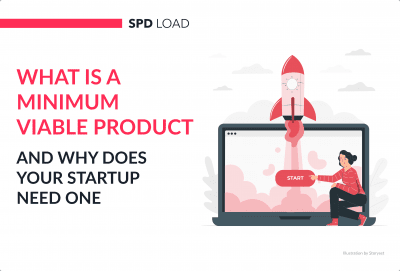10 Startup Growth Strategies That Actually Work
- Updated: Nov 14, 2024
- 14 min
Establishing your brand and scaling your startup doesn’t happen overnight. But it doesn’t have to be overwhelming either. While it may require hard work and dedication, by taking advantage of proven growth strategies, the process will be faster and smoother.
In this post, we’ve rounded up 10 of the proven business growth strategies you can practice for a startup. The first few strategies are cost-effective ones so you can make the most out of your investment. When you start to see results, you can then implement the rest of the strategies to scale your business further.
There’s no secret way to catapult a startup to success, but by exercising the strategies on the list, you can accelerate your growth with efforts that are sure to bring results.
Let’s get right to it.
Need a remote team to support your project? Check out our guide on how to hire a dedicated remote team for top results.
Grow your startup globally with our clear marketing plan that brings real results.
1. Establish an Online Presence
What better way to reach hundreds of people from your target market in the shortest amount of time than by increasing your presence where they usually hang out – online. There are several things you can do to increase your online presence. We’ll list down each one and discuss how it’ll help you with your growth goals.
I. Google My Business
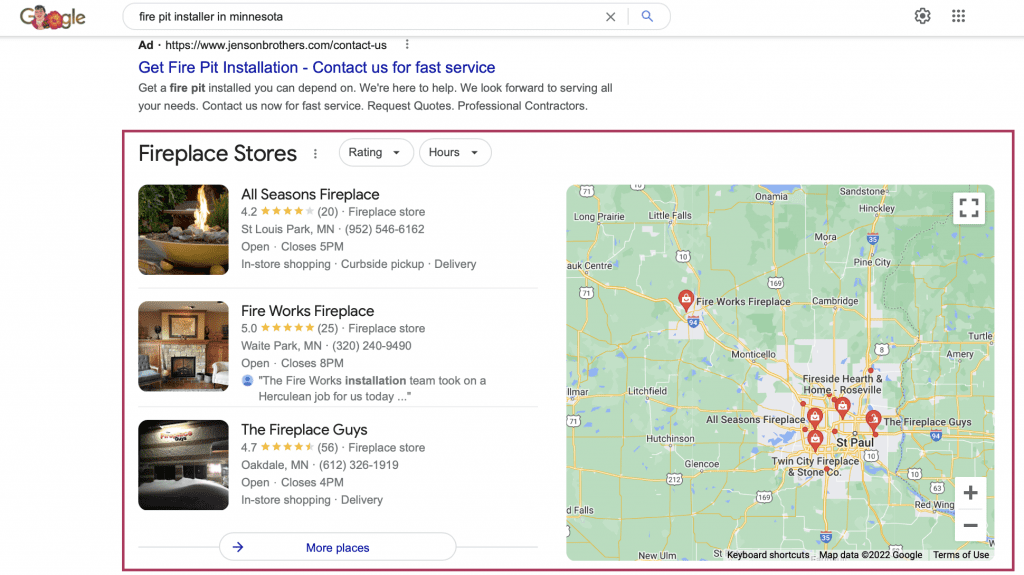
Creating a Google My Business account will especially help you grow your startup if your business is targeting a local audience. Many customers would rather search for a service online than go around the neighborhood looking for a flower arrangement service or a home fire pit installer.
By creating a business listing on this platform, customers will see your business when they do a Google search. It’ll even provide them with necessary information like your address, business hours, and contact number so they’ll know how and when to contact you. Additionally, you can also provide relevant photos like your storefront to locate the business easier and photos of the services you provide as some sort of portfolio.
What’s great about taking advantage of Google My Business is that you can create your business listing for free. It also provides you with insight that will help you identify where users are coming from and how they are finding your business online.
II. Social Media Marketing
Creating an account for your business on Facebook, Instagram, LinkedIn, and Pinterest will also help boost brand awareness and market penetration for your startup. Also, there is an option to turn off comments on Facebook to hide spammy comments and trolls and to ensure better reach.
You can also ask for assistance from a brand agency for this.
With active social media accounts, you can interact with potential customers and market to an even wider audience thus increasing your customer base.
If you wish to maximize your existing customer base’s potential, consider utilizing various platforms.
For instance, knowing that you can find someone by phone number on Facebook enables you to engage potential customers or collaborators with greater ease and efficiency.
This feature streamlines your outreach efforts, allowing you to connect directly with individuals who matter most, ultimately enhancing your marketing and business strategies.
It makes you more accessible to customers and makes it more convenient for them to ask questions about product availability or service schedule.
On your social media platform, you can promote products and services. One way to do this is to use ads on social media, and Instagram is a great place to start. If your goal is to gain more followers, make sure to use the Instagram follower tracker tool to understand what works well and what needs to be improved to reach wider audiences.
You can further enhance your visibility and engagement, reaching an even wider audience by interacting with users on Instagram Threads, a new social media platform.
You can post each of the products you sell or photos of the services you provide. You can also use it to inform your audience about new products and relevant information about the niche you’re targeting. Additionally, as more users interact with your social media account, business awareness doesn’t just grow, but brand credibility as well, especially when customers get back on your page to provide comments about your products and services.
Not only are social media accounts cost-effective marketing platforms, but some also come with selling functionality so you can do sales right on social media. Make it a part of your market expansion strategy.
III. Create A Website
Creating a website gives you more opportunities to grow a new market and work out their loyalty to your brand. By having a website, you add more credibility to your business and thus people will be more willing to explore what you can offer.
As they start to trust you, you can use your website as a hub to feed them news about your products and services nurturing new leads and retargeting the existing market. As you create valuable content for them (which we’ll talk more about a bit later) they’ll start considering you as an authority in the niche.
Planning a crowdfunding platform? Learn what goes into crowdfunding website development.
IV. Search Engine Optimization
SEO for startups is the market penetration strategy of making online content that’s easily available while searching for a particular query. While this involves using relevant keywords, or words that searchers usually use when searching online, it also involves off-page and technical efforts.
SEO can be broken down into 3 parts: on-page SEO, off-page SEO, and technical SEO. On-page SEO is where you optimize the copy of your online content. You will use keywords and their long-tail variations on the website text, meta tags, and URLs. This will tell search engines what your content is about and show it to users searching for the said topic. You can use SEO tools like Ahrefs, Semrush, Ubersuggest, and Google Trends to find high-volume keywords.
As for off-page SEO efforts, this involves making ways for other websites to link to yours. This is called backlinking. When you get lots of backlinks from reliable websites, it will boost your website’s credibility as well, giving more reasons for search engines to show your content as a result of queries. One way to get backlinks is to do guest blogging on websites related to your niche.
Regarding technical SEO, this is mostly worked on by web developers on the backend like building an XML sitemap. They optimize the website to be more crawlable for search engines. To get on the good side of the algorithm, you can also contribute to optimizing the page speed. You can do this by using media with low file sizes, but not to the point where the quality of the video or image is compromised.
Wondering about the cost of hiring a software developer? We break down what you need to know.
V. Blogging
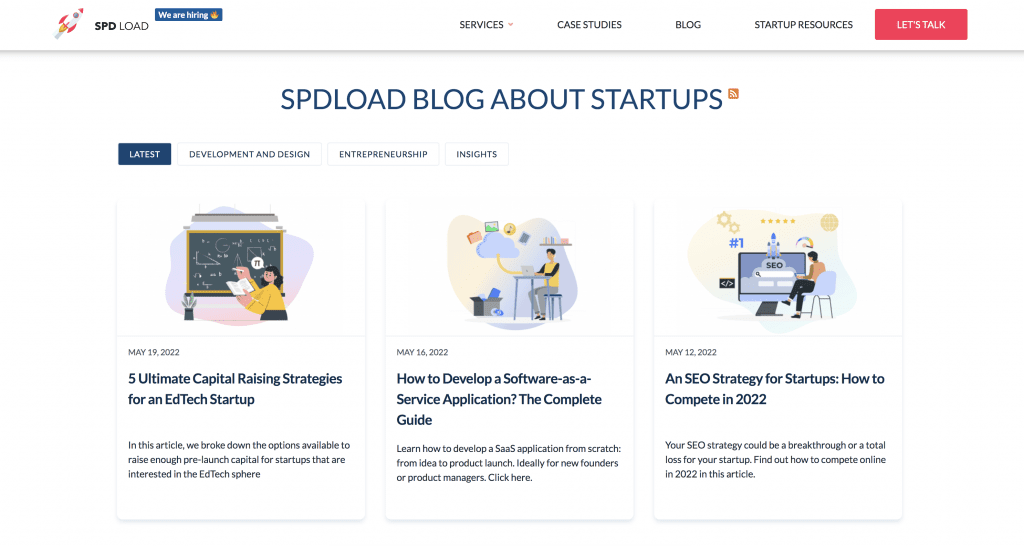
Blogging can do two things for you: position yourself as a thought leader in the industry and provide more opportunities to work on SEO. By creating informational and applicable content, people will start to develop trust and turn to you for matters related to the industry. Thus, when you start to advertise products or services, they’ll be more inclined to trust what you promote.
Additionally, since your content will be in text format, you can use this as an opportunity to inject high-traffic keywords to bring more visitors to your website. You’ll have more chances to rank high on search engines where more users discover your brand.
This way, businesses use blogging to their advantage.
For example, Sleepjunkie, a sleep and mattress content website, writes content on different niche-related keywords to gain maximum search traction.
VI. Video Marketing

Creating useful blog content takes time to research and put together. You can make the most out of this effort by reusing the written content you made into video format. This way, you can target not just the audience who’d prefer to read content, but also those who like to consume them in video format.
Additionally, by turning your blog into a video, you can target more people on video platforms like Youtube. More people will discover your brand and in the long run, as you consistently publish videos, you can start monetizing your blog for an additional income source.
You can also squeeze in the video’s value into a few seconds and upload it on TikTok, a video-based social media platform that’s growing in users exponentially.
You can even add a link to your TikTok bio to drive your audience to your website or platform of your choice.
This means more audience and new customers for you to tap into.
Create interesting videos, and draw people in by making the first few seconds enticing. Provide them with applicable content and finish off with a call to action, either to subscribe to your channel, watch more of your videos, or visit your website.
TikTok changed the game — now it’s your turn. Learn how to make a TikTok-like app with all the right features.
VII. Email Marketing
While you can start creating an email list early on, you can also utilize email marketing for existing customers and “would-be” customers. The latter would be those who either visited your website or added items to their cart but didn’t push through with the purchase. You can leverage email marketing for cart abandonment recovery efforts to get “would-be” customers to pick up where they left off and finish the transaction.
As for existing customers, you can use email marketing for market development to nurture these leads and turn them into loyalists and even word-of-mouth marketers. Additionally, you can use email marketing to promote new offers and releases.Including an HTML email signature in your campaigns can further enhance your brand’s professional image and provide additional information such as contact details and social media links.
Boost your outreach efforts with the best email marketing software platforms available today.
2. Know Your Target Audience
In the current business landscape, it’s all about making customers happy. You can only do this when you understand what they want and what their pain points are. Presuming their interests and issues will only get you so far. It’s important to figure out their likes and dislikes by gathering data and analyzing metrics from tools like Google Analytics or heatmaps. 
Using this tool, you’ll learn what they are most interested in and their buying timelines. You’ll also see how they interact with your website giving you an idea about what they want and what they’re not. Additionally. Google Analytics also provides demographic and market data that will tell you the most common interests of people in a particular age or gender group.
Using the data you gather, you can make your offers more accurate and thus more enticing for potential customers. It helps with product development and altering existing products to be more interesting for the current market.
3. Prioritize the Customer Experience
This third strategy is somehow connected to the previous one. However, with this one, you focus more on giving them a quality experience when interacting with your brand. The better you anticipate their needs and the faster you respond to them, the more satisfaction they’ll get with your brand. Take Steve Jobs, for example, he was able to figure out that even an iPhone unboxing can generate a great user experience.
Another way you can prioritize customer experience is by diversifying your offer. While you have a certain target audience in mind, people in those groups still have different preferences, and offering them choices will mean more chances of satisfying their wants.
Additionally, when designing your business’ website, make sure it’s easy to navigate. Remove unnecessary buttons and make it easy for users to find products. Make the checkout process and product order forms easier by removing form fields that aren’t necessary.
On the customer service end, providing exceptional service will result in the satisfaction that turns one-time buyers to brand loyalists. Exceed current customer expectations to get word-of-mouth advertising to their network for free. If in any case, they had a poor experience with the website or with the product they got, offer them a discount to make up for it. Make them feel that their welfare is your top priority.
It’s also helpful to have an active phone system or a website live chat feature so that whenever a visitor or a customer needs assistance, it’ll be provided in no time.
You can also use a customer portal solution to streamline customer communication and handle their requests more efficiently.
Explore our SaaS services today
4. Research the Competition
You can learn a lot from your competitors, especially those who have successfully thrived in the industry for some time. Chances are, they’ve tried more growth strategies than you’ve ever practiced so you can learn what strategies work and what won’t. You can then copy what worked for them and find out what went wrong for strategies that failed so you can improve or fix them. Learn more about what percentage of startups fail.
Ask yourself:
- What are my competitors doing?
- How do they market their product line?
- What platforms have they utilized?
- How did they craft their funnel?
- How did they design their campaigns?
Make a market research and competitive analysis of successful companies. Use them as benchmarks in gauging if a strategy is worth doing or not. List down their marketing efforts and determine what brought them the most results. You can emulate these strategies along with finding ways to improve or fix what didn’t do them so well.
5. Launch a Loyalty or Referral Program
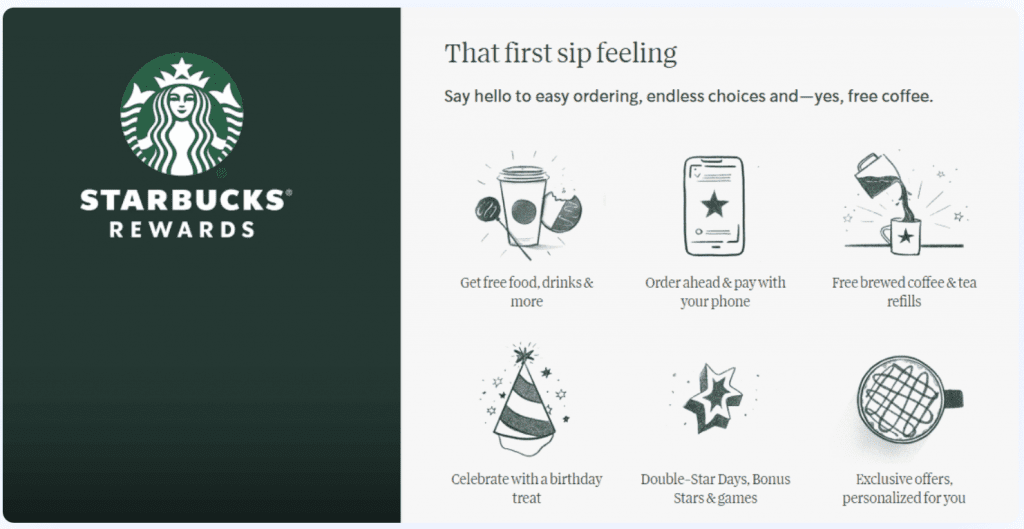
Customers love benefits and you can offer just that by employing loyalty programs as an acquisition strategy. It comes in all shapes and sizes from point-based systems for purchases to percentage discounts for succeeding purchases.
Earlier we mentioned word-of-mouth marketing. Granted, customers will freely talk about your brand when they’re satisfied with your services. But with a referral program, you give them additional incentive to do so. With referral tools, you can select from different referral incentives, like discounts, cash rewards, or custom gifts. Think about this: people will likely listen to peers rather than to the best salesperson you have. If their peers talk about your product, it makes it more trustworthy than if a salesperson did it.
6. Leverage User-Generated Content

User-generated content is those posted by satisfied customers on their social media accounts about your brand. It’s an aspect of word-of-mouth marketing that makes your brand more trustworthy. It increases brand awareness for many and brand loyalty for those who’ve heard and purchased from your brand before.
The next time a customer buys from you, encourage them to tell others about how they feel about your brand. When they give good reviews, you can utilize this content as part of the social proof you display on your website or your social accounts. But don’t forget to ask the customer’s permission.
7. Build a Sales Funnel
If you’ve never heard of a sales funnel before, now’s the time to learn about this customer acquisition action plan. In essence, a sales funnel is the journey your customers make on their way to conversions. It starts with brand awareness which means your marketing efforts should first focus on letting people know your brand exists. Say you’re selling a lingerie brand. There are many famous brands already so you have to put effort into making your brand known.
It then goes through the consideration stage, then the conversion stage followed by retention, and finally the advocacy stage. This means your marketing efforts have to be aligned with customer segments.
CAC calculator simplifies tracking your marketing efficiency and budget allocation. 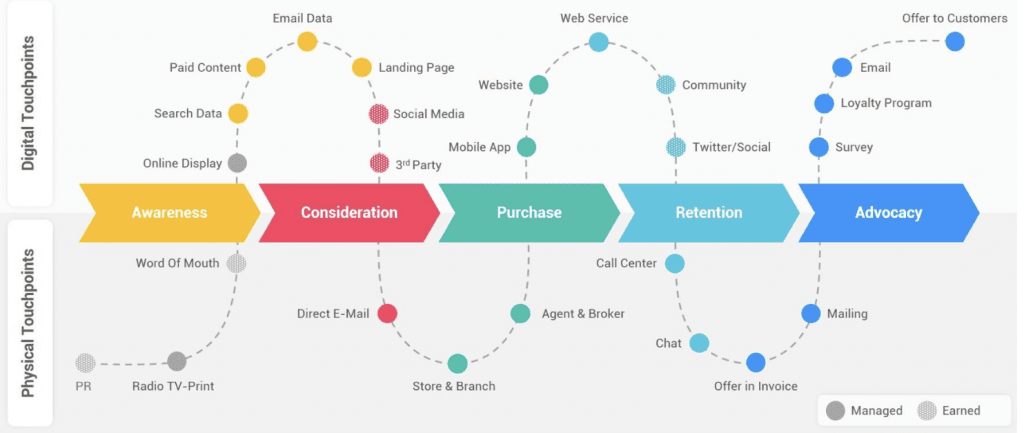
For example, the awareness stage could be your SEO strategy that allows users to find your brand when making a query. Once they click on your result, you can offer them a lead magnet in exchange for their email using a free web form builder so you can nurture the lead and give them convincing proof your product is worth buying.
A lead magnet could be an informative brochure that gives value to your leads. Use a brochure maker to create visually compelling brochures for your lead magnet.
They’ll ideally be moved to purchase and when they do you nurture the lead further by offering them discounts so they’ll keep coming back for more. Lastly, you can set up a referral program so they’ll advocate your product to others.
8. Start a Podcast
By the time you establish a customer base, you’ll have to keep feeding them valuable content so they don’t forget about your brand. Blogging and video content are the first two strategies that work with this and the third is a podcast.
Podcasts allow you to explain your thoughts or solutions to problems in a more personal way. While the first two options require the customers’ full attention, podcasts can be consumed simultaneously with other activities. Whether you’re cooking or driving, you can consume this type of content which means your brand gets more exposure.
Podcasts are great for brand recall and so if you’ve set up the initial strategies in the list, creating a podcast is the next strategy you can do to drive more traffic and nurture more leads.
Fuel your startup's growth with tailored mobile apps.
9. Host Webinars
A webinar can be an exclusive offer you can provide to your loyal customers or a way to invite potential customers to your brand by establishing your authority in the field. With webinars, you can share knowledge and produce more leads resulting in more potential sales.
This is a great strategy to do especially for niches that involve developing skills. Say your current products or services are photography-related, you can host a webinar that teaches them shooting or editing techniques including setting presets to automate the process.
You can also record your webinars and publish parts on your video platforms to tease viewers to learn more about them.
10. Foster a Productive Company Culture
Many employees stay in a job not just because of the pay and benefits but also because of the good environment it fosters. While making money is the primary reason for working, more than ever, people have become more conscious about their mental health, and this leaves jobs where they feel toxicity. 
Keeping your employees happy makes them productive. Thus, it’s important to foster company cultures that will result in this. You can set up a brainstorming session where employees can freely tell about their concerns and suggestions for work processes or product ideas. If employees are heard, they’ll feel more valued and thus boost their esteem and productivity. Long-term, it’ll result in more revenue.
Make the atmosphere more relaxed so they’ll be more inclined to open up, you can start with ice breakers like an anagram game or a “two truths, one lie” game.
Final Thoughts
Startups should be wise in choosing strategies to implement. This can mean initially going for strategies that are cost-effective like establishing the brand’s online presence. It can then go hand in hand with competitor research to get a better picture of what strategies work and what needs to be improved.
As you apply each of the strategies in your startup, you’ll start to notice an increased brand awareness followed by increased conversions. Move forward in your effort to nurture those leads and turn them to brand advocates.
As you do so, you’ll be an entrepreneur that’s scaling your new business to greater heights and increasing your share of the market before you know it.
Building a startup is challenging but rewarding. This guide shows how to start a startup from scratch.




